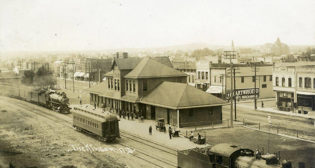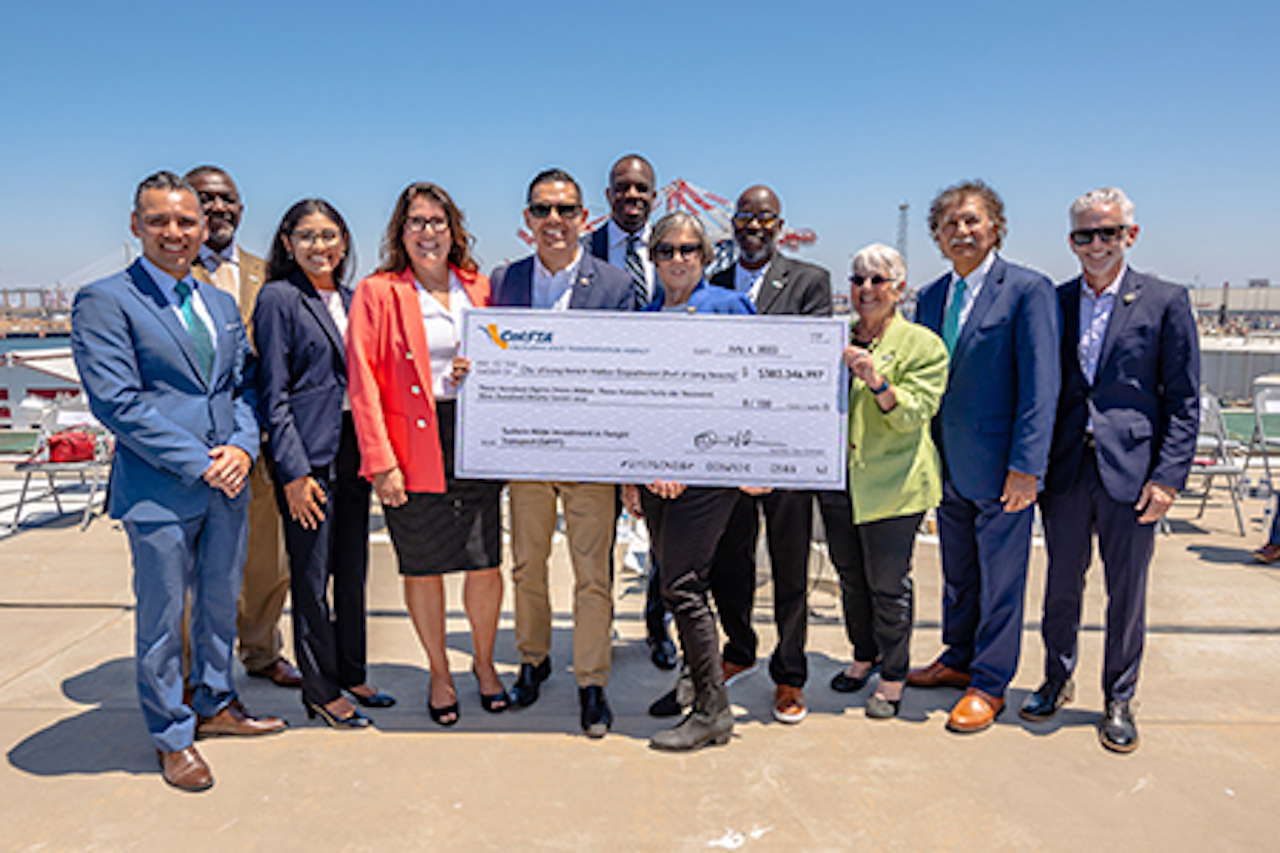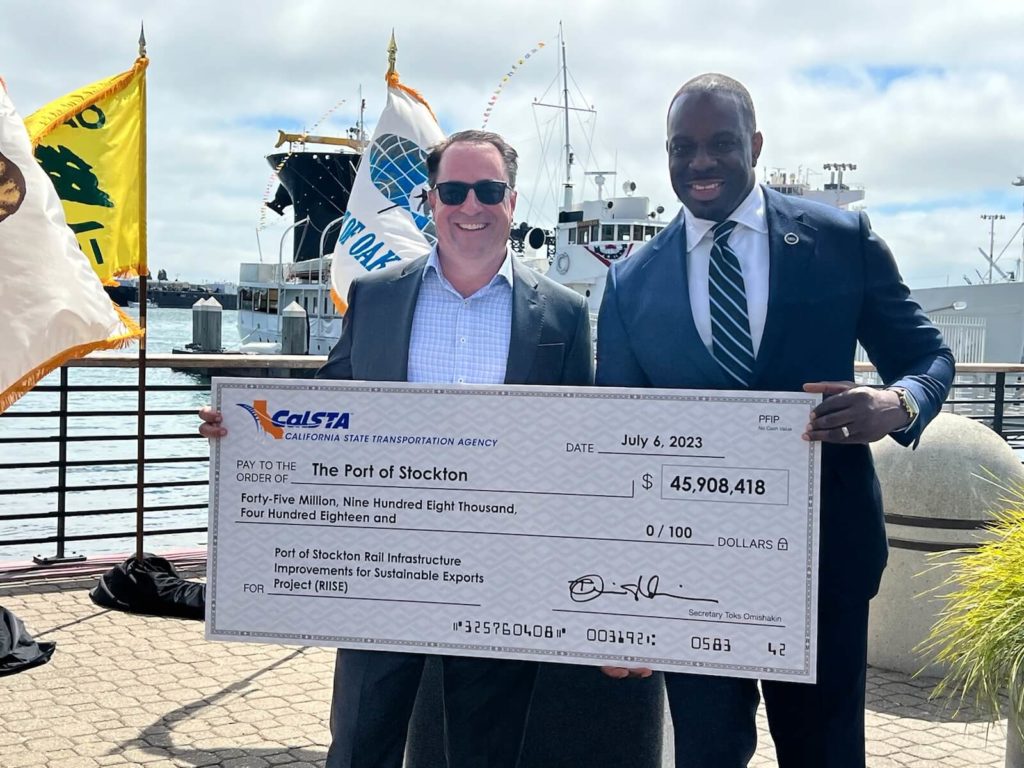
State of Calif. Announces $1.5B in Port Infrastructure Upgrades (UPDATED July 11)
Written by Carolina Worrell, Senior Editor
The Port of Long Beach has been awarded a $383.5 million grant from CalSTA to complete a series of construction and clean-air technology projects.
The State of California on July 6 announced an investment of more than $1.5 billion—including approximately $450 million for zero-emission infrastructure, locomotives, vessels and vehicles—as part of the state’s work to build a more “efficient, sustainable and resilient supply chain.”
According to the State of California, the $1.2 billion will fund 15 projects creating an estimated 20,000 jobs and “increase the capacity to move goods throughout the state’s global trade gateways while lessening environmental impacts on neighboring communities.” Administered by the California State Transportation Agency (CalSTA), $350 million was also awarded to 13 projects that eliminate street-level rail crossings to make “critical lifesaving safety improvements, reduce emissions and keep goods and people moving.”
Projects receiving funding will help boost capacity to move goods through the ports of Los Angeles and Long Beach—the busiest ports in the Western Hemisphere—as well as enhance all major trade centers throughout the state—from San Diego to the Central Valley to the Bay Area. The high-priority grade separation projects, the majority of which are funded through the Transit and Intercity Rail Capital Program, will improve safety and reduce conflicts and delays at railroad crossings, helping enhance the state’s freight and passenger rail systems, the State of California said.
The funding—particularly the investments in zero-emission projects, which account for nearly 40 % of the Port and Freight Infrastructure Program awards—builds on a partnership between the governments of California and Japan announced this March to collaborate on strategies to “cut planet-warming pollution at seaports and establish green shipping corridors as part of the state’s broader strategy to aggressively combat and adapt to climate change.”
The investments, the State of California says, also follow the California Transportation Commission’s (CTC) recent approval of $1.1 billion for infrastructure improvements on high-volume freight corridors as part of the Trade Corridor Enhancement Program (TCEP)—for a total state investment in supply chain infrastructure of more than $2.6 billion in just the past week.
Part of the funding includes a $383.35 million grant awarded to the Port of Long Beach to complete a series of construction and clean-air technology projects aimed at accelerating the transformation to zero-emissions operations and enhancing the reliability of cargo movement.
As part of the state’s Port and Freight Infrastructure Program, nearly $225 million will fund a variety of zero-emissions cargo-moving equipment and supportive infrastructure projects across the Port of Long Beach and include “top handlers” and other manually operated cargo-handling equipment, as well as tugboats and locomotives. The sum is the single largest grant the Port has ever received to support the zero-emissions goals of the 2017 Clean Air Action Plan Update.
Additionally, $158.4 million of the state grant will go toward the planned Pier B On-Dock Rail Support Facility, which will shift more cargo from trucks to on-dock rail, where containers are taken to and from marine terminals by trains. The $1.57 billion facility will be built in phases, with construction scheduled to begin in 2024 and be completed in 2032.
As part of its Clean Air Action Plan (CAAP), the Port of Long Beach has set a goal of zero-emissions terminal operations by 2030, and zero-emissions trucking by 2035. The Port has a long track record of air quality improvement projects that have “dramatically lowered” emissions since 2005.
Additionally, the Port of Los Angeles has been awarded $233 million in grants from the State of California to complete essential infrastructure projects aimed at creating a more efficient and sustainable supply chain.
Port of Los Angeles infrastructure projects supported by the new state grants include:
- Maritime Support Facility (MSF) Improvement and Expansion Project—The MSF provides chassis and empty container storage for all 12 container terminals at the ports of Los Angeles and Long Beach, critical to facilitating goods movement throughout the complex. With this new funding, the area will be improved and expanded from 30 to 71 acres. Improvements will include utilities, drainage, sewage, power, water supply, as well as a paved perimeter roadway. The $198.2 million total project amount includes $149.3 million from CalSTA and $48.4 million in matching funds from the Port of Los Angeles.
- Rail Mainline/Wilmington Community & Waterfront Pedestrian Grade Separation Bridge—In addition to demolition work and soil remediation, the project involves construction of a 400-foot dedicated pedestrian bridge over freight tracks, creating a safer connection between the Wilmington community, several local area schools and the Port of Los Angeles’ Wilmington Waterfront area. The project will also include construction of retaining walls, storm drainage, electrical and utilities, sidewalks and landscaping. The total project cost of $57.9 million includes $42 million from CalSTA, $5.62 million from the Port of Los Angeles and $10.2 million from LA Metro.
- State Route 47/Seaside Avenue and Navy Way Interchange Improvements—This project will modify the intersection of Navy Way and Seaside Avenue to improve traffic operations, reduce collisions and improve safety. Improvements will add a new westbound auxiliary lane, a new eastbound two-lane collector-distributor road, a new off-ramp terminus and eliminate a traffic signal, among other upgrades. Total project cost of $62.98 million includes $41.79 million from CalSTA and $21.19 million in Port of Los Angeles funds.
Last week the Port of Los Angeles received a $15 million grant from the CTC for a four-lane grade separation on Terminal Island that will reduce truck delays and improve public safety.
Of the $1.5 billion awarded by CalSTA, approximately $250 million is allocated for zero-emission infrastructure, locomotives, vehicles and vessels.
Southern California regional projects totaling $191 million were among the grants announced. These include a $100 million BNSF rail expansion project in the High Desert and another $76.3 million zero-emission rail and drayage fleet support project by the South Coast Air Quality Management District, among others. These projects support the Port of Los Angeles by improving cargo movement throughout the region.
Additionally, Merced County has been awarded a $49.6 million grant—one of the largest in the history of Merced County and San Joaquin Valley—from CalSTA to build-out an inland port at Castle Commerce Center, “leveraging its unique capacity to move freight worldwide.”
The $49.6 million CalSTA grant will enhance Castle Commerce Center’s existing rail capacity by:
- Facilitating the development of 70 acres at Castle to support pre-shipment processing and intermodal cross-docking for Central Valley agricultural producers.
- Providing cost-effective, direct rail service for shippers.
- Expanding the railway to a new staging and container laydown area to support cross-docking and processing.
- Evaluating, engineering, and planning for further expansion on existing land within Castle Commerce Center.
These projects, Merced County says, will support additional goods movement to and from the Port of Los Angeles, the Port of Long Beach, and the Port of Oakland while making the County a focal point for inland goods movement.

Situated at the southeastern corner of Castle, its rail district became operational in May 2022 under Patriot Rail, which operates the rail line and has already tripled the shipping volume to and from Castle in recent months. The CalSTA grant, Merced County says, will “further enhance the viability of agricultural producers, manufacturers, and other enterprises throughout the San Joaquin Valley to cost-effectively and efficiently ship and receive goods along the BNSF railroad mainline, which runs adjacent to the site.” Castle’s inland port and rail activities is focused on increasing regional economic opportunities while reducing semi-truck traffic along its roadways.
“Patriot Rail is privileged to partner with Merced County to advance the rail foundation of an inland port at the Castle Commerce Center,” said Patriot Rail CEO John E. Fenton.
The rail district expansion project is expected to be complete by mid-2028.
Meanwhile, the Port of Stockton was awarded $45.9 million for the Rail Infrastructure Improvements for Sustainable Exports (RISE) Project through CalSTA’s Port and Freight Infrastructure Program (PFIP).
The RIISE project supports building new infrastructure to enhance rail capacity, accommodate increased freight tonnage and train frequencies, mitigate potential service disruptions, and reduce long-term repair and maintenance costs. PFIP will fund the replacement of the San Joaquin River rail bridge; expansion of the port’s long lead track to two tracks; and procurement of a zero-emission electric railcar mover.
The project will help reduce trucks traversing neighborhood streets, consistent with the priorities of near-port communities and the Stockton AB 617 Community Steering Committee, reducing public health harms and negative environmental and economic impacts.

“No other state has a supply chain as critical to the national and global economy as California,” said Gov. Gavin Newsom. “These investments—unprecedented in scope and scale—will modernize our ports, reduce pollution, eliminate bottlenecks and create a more dynamic distribution network.”
“CalSTA’s ‘Core Four’ priorities are safety, climate action, equity and economic prosperity, and the strategic investments announced today shine in all those areas,” said Transportation Secretary Toks Omishakin during an event on July 6 announcing the awards at the Port of Long Beach. “These awards—a direct result of Governor Newsom’s visionary leadership—will help maintain our state’s competitive edge in our nation-leading supply chain infrastructure and will create a cleaner, safer and more efficient goods movement system that will have a lasting positive impact for the people of California. The historic level of state funding also puts these projects in a stronger position to compete for significant federal infrastructure dollars from the Biden-Harris Administration.”
A complete list of projects is available at the following links:
- Port and Freight Infrastructure Program, including freight-focused high-priority grade separations.
- Transit and Intercity Rail Capital Program high-priority grade separations.



